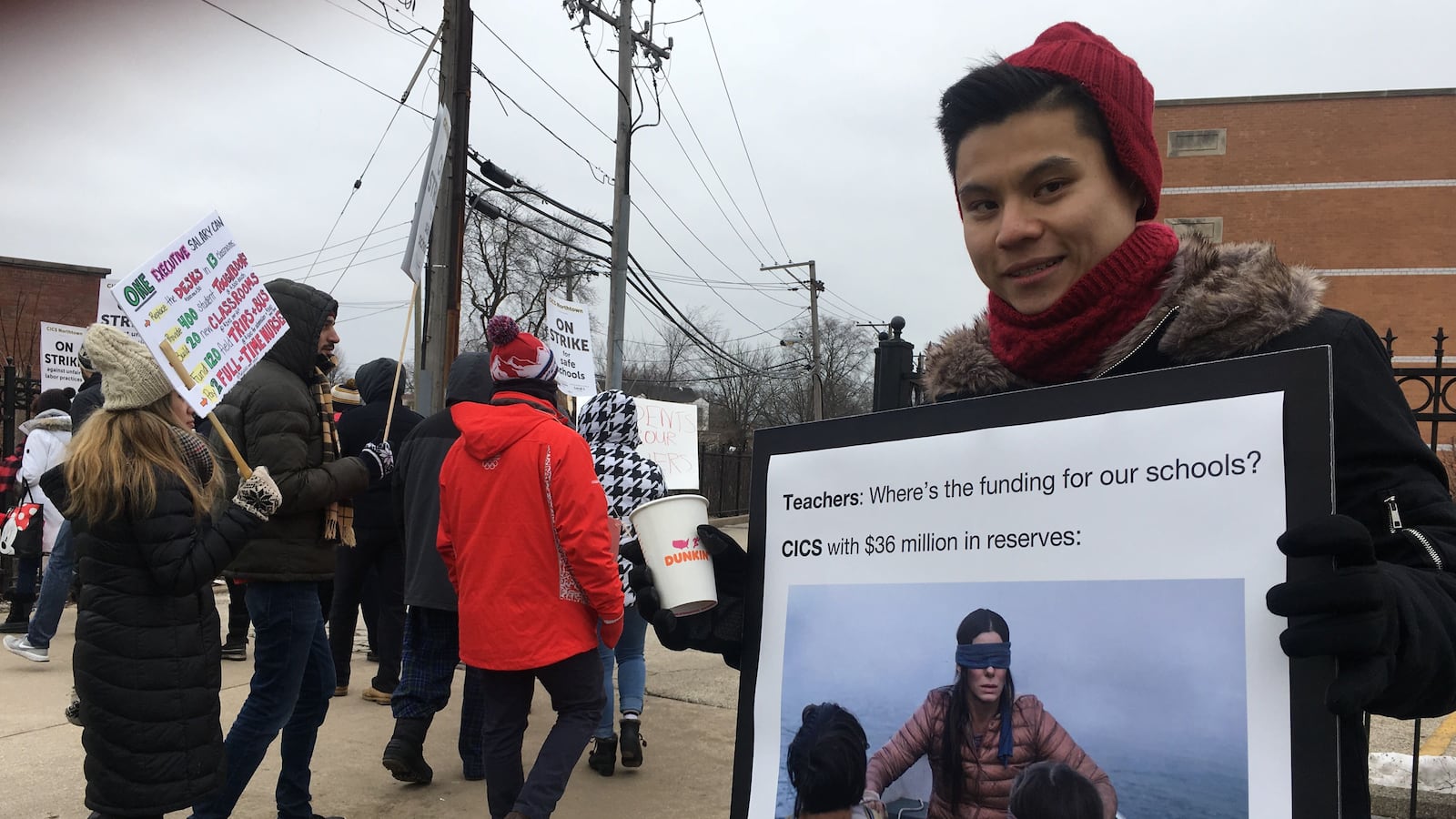On the first day of a teachers strike at four Chicago International Charter Schools, the hallways of CICS Northtown sat empty. In the school’s gym, the whir from a lone custodian polishing the floor echoed through the cavernous, empty room.
But outside the school, an energized crowd of both current and former students joined some 30 teachers, paraprofessionals and supporters who were talking, joking and chanting while marching with signs calling for more funding and in support of school counselors and social workers.
“My teachers told me they were going on strike, so I felt like I had to come and support them,” said junior Angel Ortega, who was spending his morning on the picket line.
Despite the charter network’s pledge to keep its schools open during a strike, only one student showed up Tuesday morning at Northtown’s campus, which normally holds 900 students.
Inside, Principal Torry Bennett walked briskly through through empty hallways and past the doors of silent classrooms.
“It’s incredibly sad to see a school that is normally bustling and just full of energy and positive interactions completely empty,” said Bennett, who has been the principal at Northtown for four years. “I have a large administrative team all of whom are ready to serve students, but I have only one student who made it into the building.”
With a population that is 80 percent from low- income families, Bennett said she is particularly concerned about students who are homeless or food insecure. “The fact that they are not here means they are not receiving the support services they need,” Bennett said. “We want families to know that while the strike is going on… our school is open.”
She said she supports an increase in teacher pay. “I want teachers to be fairly compensated.” she said. “You want to recruit the best and brightest in the field of education, and better wages will help us do that.”
Among educators’ demands are increased pay that rewards their education levels and experience, more counselors and social workers and smaller class sizes. They are also angry at recent changes in benefits, including no longer offering paid parental leave.
Union representatives, educators and management bargained until 10 p.m. Monday without reaching an agreement. More than 30 bargaining sessions have stretched over months.
Negotiations have stalled over a management proposal to cut school services in exchange for a pay raise. Union officials said the network has offered teachers an 8 percent raise in the first year of the contract, but only if they agree to staffing cuts in some areas like counseling and social workers.
Lisa Kane, a counselor at CICS Northtown Academy on the Northwest side, said her school was “very lucky” to have three full-time counselors and four full-time social workers for more than 900 students.
Those students are part of a particularly diverse student body that Krane says need support. At CICS Northtown, which administrators say is the most diverse charter school, more than half of the students are Latino, 20 percent of students are white, followed by 16 percent Asian, and 7 percent African-American.
But, in recent negotiations, those supports, and Krane’s job, seemed to be at risk. “They have threatened at the table that to fully fund our contract they’ll have to cut social worker and student services personnel,” Krane said.
“Student services are the glue that holds our schools together,” said Krane, a former English teacher who now provides academic and social-emotional counseling for juniors at CICS Northtown, many of whom Krane says are first-generation college students.
“We’re not looking to add positions, we’re just looking to keep the positions that we have,” she said.
Kha Tran, a second-year social studies teacher at CICS Northtown, said Tuesday morning that he also wanted to make sure that counselors or social workers weren’t cut in the negotiations. “Our student services team is very important to us and we want to make sure we keep them, that is one of the unique things about our schools,” said Tran.
He also hoped to see a reduction in class sizes, as he felt that smaller classes made it easier for his students to learn.
In his brief teaching career, Tran has experienced the uncertainty of working in public education. The first school where he taught, Amandla Charter school in Englewood, would go on to close this past summer. While he was at School District 69 in Skokie, the district narrowly avoided a strike in 2016. Now, in his second year at CICS Northtown, he was on strike.
The bargaining team continued negotiation with management at 10 a.m.

